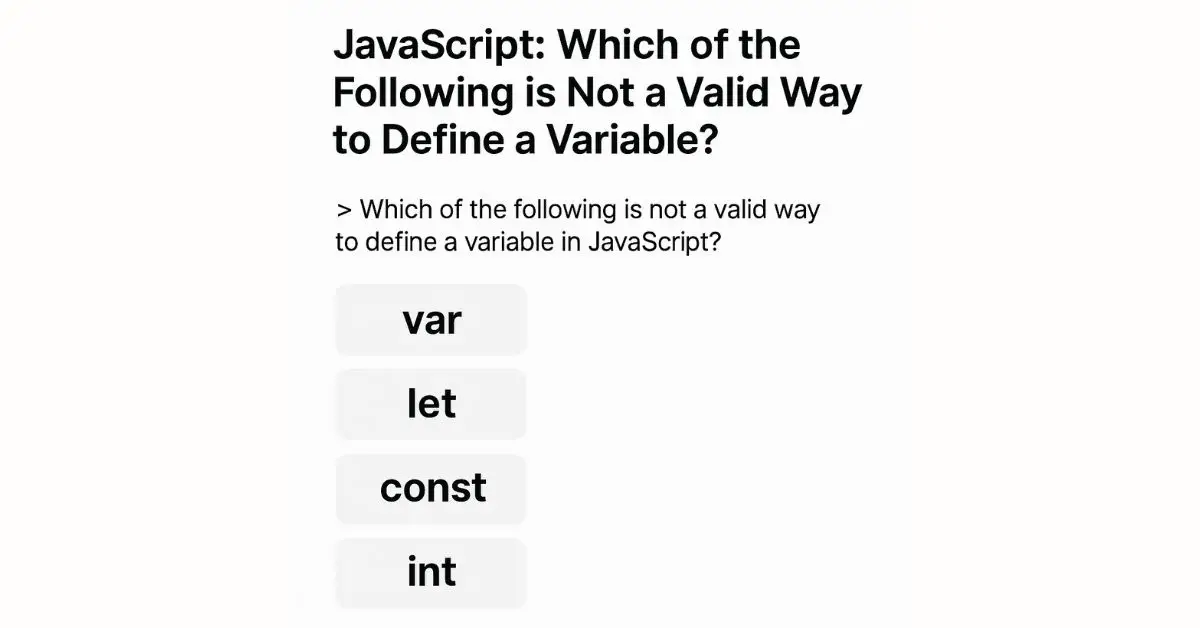JavaScript (JS) is a lightweight, interpreted (or just-in-time compiled) programming language that supports first-class functions. It’s commonly used for adding interactivity to websites but also powers server-side environments like Node.js and applications such as Adobe Acrobat and Apache CouchDB.
JavaScript follows a flexible, dynamic programming model. Variables in JavaScript can be declared using multiple keywords depending on the developer’s intention. However, not every keyword you might see is valid.
In this article, we’ll explore a fundamental question:
Which of the following is not a valid way to define a variable in JavaScript?
'var','let','const','int'
Let’s break it down.
✅ var
The var keyword is one of the original ways to declare variables in JavaScript. It was introduced in the earliest versions of the language.
var name = "John";
Key Characteristics:
- Function-scoped
- Can be redeclared and updated
- Hoisted to the top of the scope (but initialized as
undefined)
Despite its flexibility, var is generally discouraged in modern JavaScript in favor of let and const due to scope and hoisting quirks.
✅ let
Introduced in ES6 (ECMAScript 2015), let allows you to declare block-scoped variables. It is the preferred way to define variables that will be reassigned.
let age = 25;
age = 26; // Valid
Key Characteristics:
- Block-scoped
- Can be updated, but not redeclared in the same scope
- Not hoisted in the same way as
var
✅ const
Also introduced in ES6, const is used to declare variables whose values will not change. This doesn’t make the value immutable, but it prevents reassigning the variable.
const PI = 3.14159;
Key Characteristics:
- Block-scoped
- Cannot be updated or redeclared
- Must be initialized at the time of declaration
❌ int – Invalid in JavaScript
Unlike some other programming languages like Java or C++, JavaScript does not use int as a keyword. In JavaScript, all numbers—whether whole numbers or floating-point—are represented using the Number type.
int count = 10; // ❌ SyntaxError: Unexpected identifier
Why int Doesn’t Work:
- JavaScript is dynamically typed.
- No type-specific variable declarations like
int,float, ordouble. - Declaring a variable using
intresults in a syntax error.
Summary Table
| Keyword | Valid? | Scope | Can Reassign? | Can Redeclare? |
|---|---|---|---|---|
var | ✅ Yes | Function | ✅ Yes | ✅ Yes |
let | ✅ Yes | Block | ✅ Yes | ❌ No |
const | ✅ Yes | Block | ❌ No | ❌ No |
int | ❌ No | – | – | – |
Final Answer:
'int'is not a valid way to define a variable in JavaScript.
Learn More:
- JavaScript Reference – MDN
- ECMAScript Language Specification (ECMA-262)
- Beginner’s Guide to JavaScript
Understanding JavaScript Indexing: Arrays, Objects, and Beyond
How To Handle CSS Precedence in React: Guide
How to Fix Vite Import and NPM Installation Issues in React.js


